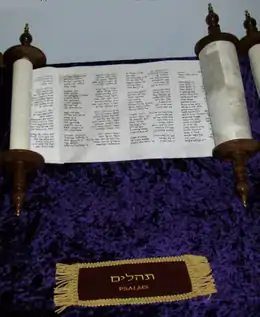Psalm 57
Psalm 57 is the 57th psalm of the Book of Psalms, in the Bible. In the slightly different numbering system of the Greek Septuagint version of the Bible, and in the Latin Vulgate, this psalm is Psalm 56. It is attributed to King David.

Structure
The Psalm consists of two parts. In the first, verses 1-6, David gives expression to the anxiety which he felt, imploring Divine assistance against Saul and his other enemies. In the second part, verses 7-11, he proceeds upon the confident expectation of deliverance, and stirs up his soul to the exercise of praise.[1]
Authorship
The Psalm is described as a Michtam of David,[2][3] when he fled from the face of Saul,[4][5] in the cave.[6][7] It was addressed to a leader of Worship.
Possibly this psalm was sung to a melody known as “Do Not Destroy” although there is considerable uncertainty about this. A number of translations have chosen to transliterate the Hebrew expression—“al tashheth” (Tanakh) and “Al-tashheth” (Margolis).[8] The same directive, "Do Not Destroy", can be found in the headings of Psalm 58 [9] and Psalm 59.[10]
Uses
Judaism
- Verse 3 is found in the repetition of the Amidah on Rosh Hashanah.[11]
References
- Calvin's Commentaries, Vol. 9: Psalms, Part II, tr. by John King, [1847-50], at sacred-texts.com.
- Matthew Henry’s Concise Commentary, Psalm 57.
- Gordon Churchyard, Psalm 57 Notes on Psalm 57.
- Spurgeon, C., The Treasury of David Archived 2014-11-08 at the Wayback Machine.
- Psalm 57 Overview.
- 1 Samuel 22
- 1 Samuel 24.
- Psalm 57 at Werner Bible Commentary.
- Psalm 58: New Revised Standard Version
- Psalm 59: New Revised Standard Version
- The Complete Artscroll Machzor for Rosh Hashanah page 321
External links
| Wikimedia Commons has media related to Psalm 57. |